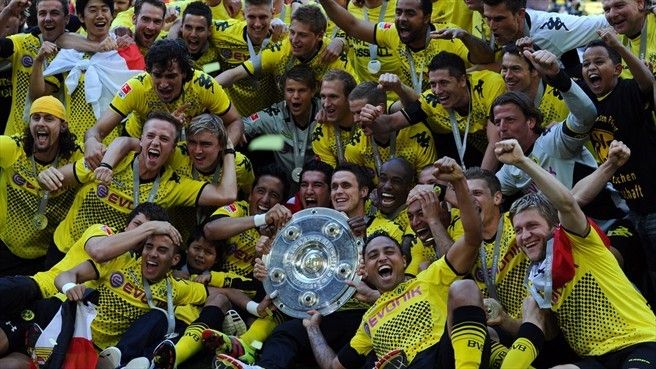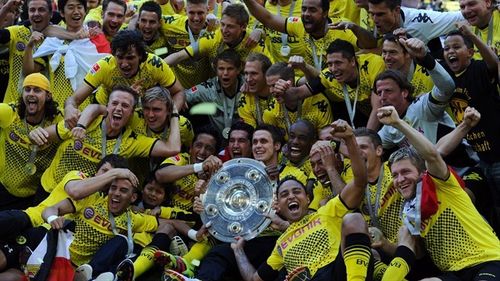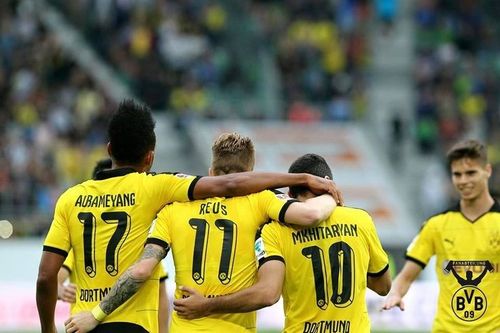
#NoMatterWhat - Borussia Dortmund’s rise to Bundesliga stardom – What fueled their success

The story of German powerhouse Borussia Dortmund from rags to riches is nothing short of a fairy tale. The BVB, then led by the charismatic Jurgen Klopp, came into notice after they won back-to-back Bundesliga titles in 2011 and 2012.
They reached the UEFA Champions League final the subsequent year, defeating the then nine times European champions Real Madrid in the semi-final but were let down by a late Arjen Robben goal in the final against Bayern Munich.
Things did not start clicking together in a snap for the club, it needed years of contemplation, adjustments and drudgery to gain back the respect they garnered from the footballing world once upon a time.
The 90’s was a golden era for the club when they won two Bundesliga titles, two DFB Supercups and a UEFA Champions League. Probably the highest point for the club was the 1996-97 Champions League triumph, and four years later the club was made public and became the first ever German team to be listed on the German stock market. They won another Bundesliga title in 2002 and reached the finals of the UEFA Cup, only to be defeated by Feyenoord.
That though was the just the start of bad times for the club as failure to qualify for the 2003-04 Champions League hurt their finances badly and they fell into debts totalling £100m. Bayern Munich loaned them €2 million so that BVB can pay the players’ wages. The club was on the verge of bankruptcy again in 2005 and were forced to reduce players’ wages by 20%. Their famous Westfalenstadion was also sold in order to raise funds to run the club.
Dortmund had a miserable next few seasons and on 19 May 2008 Jurgen Klopp was appointed as the club’s manager. Few knew that club’s fortunes will then be turned on its head as they then embarked upon a scintillating journey which saw them destroy teams left, right and center with their high-paced direct gameplay.
Robert Lewandowski, Shinji Kagawa and Lukas Piszczek were signed from Lech Poznan, Cerezo Osaka and Hertha BSC respectively before the 2010-11 season. They joined the likes of Lucas Barrios, Nuri Sahin, Mats Hummels, Jakub Blaszczykowkski and Mario Gotze.
Their star striker, Lucas Barrios, led the team with 21 goals in all competitions. There was a method which Klopp instilled in his team where they pressed their opponents’ hard, trying to get back the ball as soon as they lose it. This high-pressing game came to be known as gegenpressing and Die Schwarzgelben went on to win the Bundesliga by seven points.
Barrios and Lewandowski were just about the perfect strikers for a team who opened the opposition up with the pace of Blaszczykowkski and Kevin Großkreutz on the wings combined with the creativity of Kagawa and Gotze and the stability provided by a stern midfield consisting of Nuri Sahin and Sven Bender. Klopp's Borussia simply outran opponents with their Vollgasfussball - a high-intensity, full-throttle playing style.
The flamboyant German coach once said, “The fans should not only recognise us by our black and yellow jerseys. Even if we play in red, everyone in the stadium should think, 'Woah, that can only be BVB'. When you sit in this stadium with your eyes closed, you should sense there is a passionate team on the field below.”
The 2011-12 season saw Ilkay Gundogan come in for Nuri Sahin, who left for Real Madrid. The young players expressed themselves incredibly well in this particular season as Lewandowski scored 22 goals in the Bundesliga and Großkreutz bagged seven with both Gotze and Perisic scoring five each.
The true hero for the club was Shinji Kagawa as the diminutive Japanese midfielder came into his own mustering 13 goals and eight assists in the German top flight to see his team win the Bundesliga for he second year running.
Kagawa was bound to attract attention and Manchester United came along and lured the Japanese to the Old Trafford. Klopp signed Marco Reus from Borussia Monchengladbach for €17M and the German went on to form a famous partnership with Robert Lewandowski and Mario Gotze.
This season was more about trying to do as much as possible in the Champions League, and the team responded brilliantly and reached the final of the tournament in Wembley. Dortmund got the better of Real Madrid twice in the competition, once in the group stage and then in the semi-final.
The 4-1 demolition in the first leg of the semi-final against Los Blancos was one performance that stood out from the rest, with Lewandowski getting all the four goals for BVB in the match.
Reus, the summer signing, bagged 19 goals for the club in all competitions with Lewandowski getting 35 and Mario Gotze 16. The trio was the flag bearer for the team from Westfalenstadion and finished second behind Bavarian giants Bayern in the Bundesliga in both the 2012-13 and 2013-14 seasons.
Both Robert Lewandowski and Mario Gotze left the club for Bayern Munich within the next year as the club finished seventh in the 2014-15 season and Jurgen Klopp left the club, saying he had done all he could for the club and that they needed a better manager.

Thomas Tuchel was appointed as the new manager, who was a young manager similar to Klopp when he was appointed, having great belief in his own style of play.
The club currently lie in second position behind Bayern Munich in the Bundesliga and the trio of Pierre-Emerick Aubameyang, Marco Reus and Henrikh Mkhitaryan are running rings around their opponents.
The team are now playing a more possession-based system, but still break out with great pace and directness and remain a great team to watch. Here’s hoping they continue in the same vein in the future and achieve more and more successes.